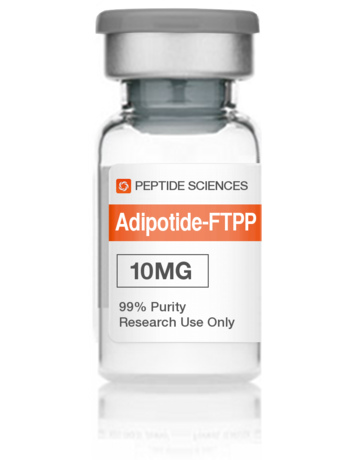Adipotide FTPP 10 mg (proapoptotic fat-targeting peptide)
Aditpotide, also known as FTPP, is an experimental peptidomimetic for weight loss with the amino acid sequence CKGGRAKDC-GG- D (KLAKLAK) 2 , which was developed by researchers in the United States to fight obesity. Peptidomimetics are small protein-like chains designed to mimic peptide. A peptide called Adipotide was developed by American researchers in the fight against obesity. This experimental treatment reduced the weight of treated monkeys by 11% due to the reduction of adipose tissue, BMI and waist circumference.
Clinical research studies have shown that a peptide-like compound, Adipotide, is able to kill fat cells, thereby causing a decrease in the volume and mass of subcutaneous fat, which, in turn, leads to weight loss. Adipotide is able to kill adipocytes (fat cells), selectively causing programmed cell death (apoptosis) of blood vessels that supply adipocytes. Due to a lack of nutrients, subsequent starvation (which causes cell atrophy or a decrease in cell size) and waste accumulation in adipocytes;
Molecular studies have shown that adipotide has a unique stereochemical (3D) conformation that allows it to bind to only two receptors in the body: ANXA-2 and spratitin. These receptors are located on the surface of the endothelium (inner lining of the wall) of blood vessels supplying white adipocytes, and as such, these receptors confer tissue specificity adipotide. The formation of white adipocytes occurs only when the degree of energy consumption far exceeds the use of energy, and its (white adipocytes) formation and accumulation in the subcutaneous layer is a sign of obesity.
Get rid of obesity with Adipotide FTPP 10 mg
Pathological studies have shown that obesity is a risk factor for many diseases, such as cancer, hypertension, endocrine disorders (such as diabetes, hyperlipidemia, and metabolic syndrome), cardiovascular diseases (such as stroke and myocardial infarction), and degenerative diseases (such as osteoarthritis). In addition, aberrant accumulation of white adipocytes predisposes the patient to lipoma and lipomatosis. It is well known that abdominal obesity is mainly caused by white adipocytes, and this form of obesity is the most lipolytically active, therefore it requires a constant blood supply. Any intervention in the blood supply causes it to activate the apoptotic process.
Selected studies
Research conducted by Mikhail G. Kolonin and others showed that adipotide has the ability to cause apoptosis of the vascular bed of white adipocytes in mice, which leads to the normalization of metabolic processes.
Corresponding research conducted by Kirstin F. Barnhart and others. In monkeys, it was shown that adipotide induces apoptosis of the vascular bed of white adipocytes with resulting weight loss and normalization of insulin function. These studies show that adipotide causes weight loss by causing selective apoptosis.
Adipotide and fat loss / weight loss
Adipotide is an experimental drug that prevents blood supply to fat cells. It helped obese monkeys lose an average of 11% of their body weight in four weeks, possibly paving the way for therapy in humans, according to a recent scientific study. A study published in the journal Science Translational Medicine shows that body mass index and waist circumference were reduced in rhesus macaques.
Buy Adipotide on the Internet
The experimental slimming agent "Adipotide", used by researchers from the Anderson Center, consists of a substance that binds to a protein on the surface of blood vessels, eats fat cells, and also a synthetic peptide that destroys fat cells, say the authors of the study. , These cells are then metabolized by the body, which destroys them and is removed from the body. The visual test also showed a significant reduction in adipose tissue in the body of these animals compared to the untreated control group, researchers from the Anderson Cancer Center, University of Texas (South) suggest. The Koch Center at the University of Texas, the main sponsor of this research.




There are currently no reviews for this product.
Your review will be the first.
Tell other users of the site about the advantages and features of the product, share your impressions and expert opinion.